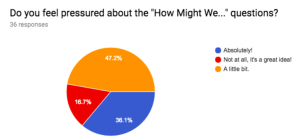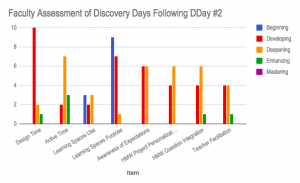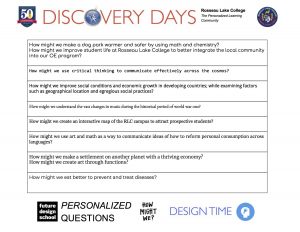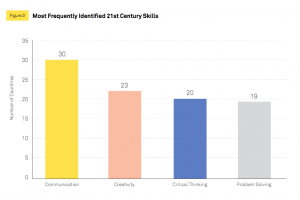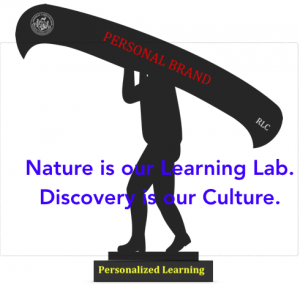PROGRESS REPORT
EARLY FEEDBACK (Day 6 of 12)
The initial six weeks of Rosseau Lake College’s DISCOVERY DAYS have had a mixed reception amongst a small percentage of students and parents. Early criticism came from our Grade 12 class who felt this type of “experimental” learning would interrupt their academic goals of achieving high marks for post-secondary applications. They initially preferred the old system of teacher-developed ISU’s (Independent Study Units) or CT’s (Culminating Tasks) delivered in the last two weeks of a course. DISCOVERY DAYS’ longer timelines gave some students increased stress.
Much of this student-created survey can be interpreted as resistance to change and aversion to risk, especially with those students who have succeeded at the “game of school”. Now that the rules are changing, the development of new skills in previously untested areas is uncomfortable.
A small percentage of dissension has come from traditional analytical learners who feel classroom instruction has been diminished and therefore their opportunities to obtain important information in knowledge-based subjects such as Science and Math compromised.
The academic team sat down with students to listen to their voices and concerns and develop workable solutions. One such solution involved the creation of a “University Preparation” club, for senior students, to run during the Winter Term Active Time block. Facilitated by Math and Science teachers, this period will be used for a multitude of senior academic purposes: individual study, tutorials, catch-up classes, guest lecturers, and post-secondary application workshops.
As well as surveying the students on their level of engagement, we also asked the faculty to assess our progress with individual DISCOVERY DAY initiatives. Again, the results were not surprising given how different and unstructured these days can initially feel. Learning Spaces are still not being recognized or utilized by students as differing to their classroom function. Many students are drawn to spaces because of friendship groups rather than project needs. The Discovery Projects themselves are open-ended and some facilitators find it challenging as to how to help motivate students or link ideas to finished products.
What does success look like?
As quantitative achievement data has yet to be calculated (realistically, we will have to measure this with a longitudinal study over numerous years), we have only anecdotal responses and engagement surveys to gauge initial reception. Active Time has already been received positively by the majority of students who tend to learn in this manner.
For most students, success with Design Time and Flex Time may look something like appreciation of new skills learned and broader knowledge shared. Often times general academic acceptance is retroactive and only given credence after the fact or in the case of individual recognition.
For teachers, success will be in the form of professional development, sharing exciting and innovative ideas around the concept of facilitation.
For me, success already looks like this:
Our entire student body is involved in Project-Based Learning and has developed “How Might We… ?” questions. Added to that, more than half of the students have fully integrated questions that cross most or all of their subject areas.
One definitive measure RLC will be searching for, however, is the quality of the projects themselves. Deep learning experiences should lead to more original and interesting end products. It remains to be seen if the grade-oriented Discovery Projects or the fuelled-by-interests Passion Projects will produce that much-lauded exemplar. In either case, successful projects will be shared and displayed for present and future students of RLC to gain inspiration for continued discoveries.
SUMMARY CONCLUSION
A desire to see what students can do with their hands inspired a recent change at one of the world’s most renowned campuses. Massachusetts Institute of Technology (motto: “Mens et manus,” Latin for “Mind and hand”) now gives applicants the option of submitting a Maker Portfolio to show their “technical creativity.”
Applicants can send images, a short video and a PDF that shed light on a project they’ve undertaken — clothing they’ve made, apps they’ve designed, cakes they’ve baked, furniture they’ve built, chainmail they’ve woven. M.I.T. also asks students to explain what the project meant to them, as well as how much help they got. A panel of faculty members and alumni reviews the portfolios.
– Eric Hoover (Education Life), New York Times, November 1, 2017
Post-secondary needs have changed. Universities and colleges are starting to require evidence of 21st-Century skill development as part of their application process. Technology, especially developments in Artificial Intelligence (AI), ensures that many jobs will soon become automated, forcing greater reliance on those humanistic attributes that can’t be easily “Googled”.
Despite some resistance to this change at all levels of education (teachers, students, parents, board members) there is sufficient evidence to suggest the tide has already turned and those schools not incorporating at least some aspects of these learning modalities will quickly find themselves behind the times.
The DISCOVERY DAYS model is perfectly suited for smaller independent schools looking for ways to innovate teaching and learning within a traditional framework. |
Benefits of a Discovery Day ‘Inquiry & Experiential’ Program:
- Student autonomy helps foster resiliency
- Cross-curricular projects help develop critical thinking skills
- Longer time-scale for projects helps promote self-management
- Interweaving direct instruction during the week helps students make authentic connections to their project as it unfolds
- Passion projects help produce engagement and intrinsic motivation
- Vertical integration helps foster mentorship and collaboration
- Club creation helps promote entrepreneurship
- Outdoor Learning helps promote mindfulness and environmental awareness
10 Next Steps
- Ongoing communication with all stakeholders (parents, community, board, CIS Ontario, CAIS, media)
- Targeted communication with students regarding weekly objectives (via Discovery Board, Google Classroom, Instagram, assembly announcements)
- Co-construction of assessment rubrics and templates for (discovery & passion) projects
- Further facilitator training (action plans) for teachers
- Observation, feedback, and support for teachers in new facilitator role
- Individual budgetary line items for various Discovery Day expenses
- Booking of whole-school activities and upcoming guest speakers (spring)
- Building of NEW Makerspaces (Tinkering Space & Music Recording Studio)
- Planning of Discovery Fair with Mastery Badges (https://credly.com/badge-builder)
- Planning and scripting of DISCOVERY DAYS marketing video (spring)

